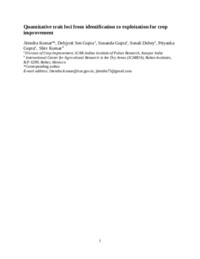Quantitative trait loci from identification to exploitation for crop improvement

Authors:
Rapid advances in the fields of genetics and genomics after the discovery of Mendel’s laws of inheritance have led to map many genes/QTL controlling qualitative and quantitative traits in plant species. Mapping of genomic regions controlling the variation of quantitatively inherited traits has become routine with the abundance of polymorphic molecular markers. Recently, the next generation sequencing methods have accelerated research on QTL mapping using both linkage and association mapping approaches. These efforts have led to identification of closely linked markers with gene/QTLs and identified markers even within the gene/QTL controlling the trait of interest. Some of the notable successes of utilizing major QTL in cultivar development include Fhb1 for Fusarium head vlight ressitance in wheat, Sub1 for submergence tolereance in rice and major QTL for resistance to cyst nematode in soybean. Efforts have also directed towards cloning of gene/QTLs for identification of potential candidate genes responsible for a trait. New concepts such as crop QTLome and QTL prioritization hold promise to accelerate the precise application of QTL for genetic improvement of complex traits in crop plants. In the present article, we reviewed QTL mapping approaches from identification to exploitation in plant breeding programs, and introgression of favourable QTL alleles through marker assisted breeding for improving productivity in major crops.
